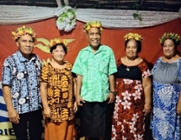Youth in Cities dialogue - part two

13 May 2023
The second session of the Youth in Cities dialogue, aimed at audiences in Africa, Asia and Europe, took place on 11 May.
As with the first session, the scene was again set with an introduction by CLGF Secretary-General, Lucy Slack about why it was so vital to connect with young people in the Commonwealth on the future of our cities; and a presentation of the research paper by Jane Lumumba. It was clear that many of the views about concerns and priorities for the future were shared by young people in these regions, with more inspirational stories about what was already being put in place to address the need to involve and enable young people to play a meaningful role as architects of our future cities.
A view from eThekwini
Eric Apelgren of eThekwini Council, Durban began the panel discussion by explaining that a Youth Office had been established in the office of the Mayor of Durban to set up programmes specifically for young people. Economic targets have been set to involve young people, as well as women, disabled and other group where representation is poor. Procurement systems are structured to give consideration and access to young people to ensure inclusion. A dedicated HIV Aids programme targeting young people has been established; still a significant issue affecting the Continent which needs highlighting and attention. Durban also has programmes for small businesses and young people in both the formal and informal sectors, opening up the economy through activities like festivals.
Mental health and wellbeing
The damaging floods last year caused by climate change resulted in many deaths, looting and civil unrest which, in turn caused much trauma to young people. Exacerbated further by high unemployment, issues around wellness such as depression increased and, to address this, important mental health programmes have been developed and are ongoing, including sports, arts, cultural events with the opportunity to have a face-to-face dialogue with social workers. The City People van has been established to serve as a mobile support for homeless young people. With six Sister City relationships, Durban uses these as a platform to bring young people together to exchange ideas and widen perspectives. Finally, there are agri-economic projects to teach young people about mitigation and rolling back the impact of climate change and in relation to employment prospects.
An LGA perspective from Sri Lanka
From a local government association perspective, Ms Hemanthi Goonasekera, the Secretary-General of the Federation of Sri Lanka Local Authorities (FSLGA) talked about youth unrest in Sri Lanka. A Commission set up in the 1990s to look at youth resulted in a quota being established requiring 40% of local government politicians to come under the description of youth. This was, however, abolished when the quota for women was established, although the act includes a clause saying that young should be considered within this. This has resulted in a lack of a tangible relationship between young people at the local level and national government, with no opportunity to feed in their views. FSLGA therefore set up the Multi-Party Youth Dialogue initiative which allows young people of all parties and genders at the local level to come together to discuss what they believe the key issues, are and how they feel. It is an effective platform to network and serve as a lobbying group, with interactions continuing through the dedicated WhatsApp group they created.
After more than 20 years of war, ethnic groups are fragmented, living in their own pockets with little ethnic harmony. Young people have therefore been encouraged to come together and interact, using existing youth groups, rather than creating new structures and this is tackling the mistrust and misunderstanding of local politics at the youth level. She concluded by saying that there needs to be more formal structures in councils to ensure youth are at the heart of decision making, but this has to be institutionalised, a permanent fixture with a legal instrument to become a mandate for councils, and not just a project.
Action in Kenya on youth
Kenya governor, HE Wisley Rotitch became a deputy governor at the age of 28 and a governor at 33, and believes there is not one specific formula for success in politics, it is all about finding the way that suits you personally. The Enable Programme allows forums for young people to talk to each other and discuss what they really want. Employment is one of the most important issues and has little formality. Programmes have been introduced to allow young people to train and get qualifications to allow them to find self-employment. They are also provided with some of the practical tools they need to provide services as plumbers, electricians or tilers which are much needed trades. Youth internships have been created in various departments. A cash crop scheme provides seeds for young people to grow. There is also recognition of the significance of digitisation, both in terms of the growing number of jobs it creates and its role in accessing employment. Digital incubation hubs have been set up with computers, internet access and the space for young people to apply for jobs online, including software development and programming and improve their skills in this area. Sports tournaments offering monetary prizes attract people to one place and encourage discussions on employment, mental health, financial literacy, building business and other issues of interest to youth. Procurement is hard for young people when they do not have the funds to submit a tender for various services. In partnership with local banks, arrangements were ongoing to make loans available and for councils to guarantee repayment and 30% of the procurement budget is ring-fenced for young entrepreneurs.
Calvin S Odhiambo, an activist from Nairobi explained that is was important to have programmes that respond directly to the priorities of young people. His work involves engaging young people in waste management and, based on his urban background, translating things into liveable aspirations. He described how the city had changed from being very green in the 70s to how it is now. It is vital to be able to support young people who have ideas. Talent competition is important to assist with inclusion. There are also localised initiatives which employ young people to clean the local environment. Most important is having Intergenerational exchange of knowledge and different departments that speak to each other.
City planning in the UK
Will Steel, a city planner from Leeds, a city in the UK and a member of the Commonwealth Sustainable Youth for Urbanisation Network (CSYU) explained that cities are increasingly using spatial planning to create inclusive cities to meet the needs of youth. Thematic city-wide policies are supporting healthy lifestyles with new roads, parks and public spaces and transport being built in Leeds before homes, to ensure transport access to employment. All UK cities are looking at ways of removing cars from the centre and consultation with young people on city centre development is vital. Leeds has a Parks and Green Spaces Policy Priorities action plan consultation and is working with young people, communities and the council on its design to identify areas for development. in the city of Sheffield, there is a stipulation that housing must cater for young people and families. The national government’s Levelling-Up Bill asks for more accountability and transparency in relation to youth. Bristol City Council has worked with children and young people to coproduce a strategy detailing overarching implications for a council wide integrated approach. The My London is a 6-month lab programme which enables social action; youth have come together from across the city to utilise local knowledge to produce models that increase opportunities for young people and amplify the youth voice. In Cambridge, young people were invited to review the council’s plans for redeveloping a housing estate, with training on different aspects and their recommendations for the use of public spaces were supported by the councils.
Will concluded by promoting the CSYU network as a platform for professionals in local government, university research planning and architecture. Find out more about this network and how to join. With circa 1000 members already from across the globe, its primary purpose is to advocate for sustainable urbanisation in relation to youth and to come up with viable solutions and ways to achieve this and all professionals in these areas are invited to join. He described how 2023 had been designated the year of youth and many projects had been planned from the Child Youth Challenge to come up with the acceleration of energy transition. Alan Pollard, a local government CSYU Steering Group member is involved in a wetlands redesign project in Belize to look at reclaiming land for homes. He described some of the eight projects lined up by the Commonwealth Youth for Sustainable Urbanisation network to mark the Year of the Youth, including: Cities by Citizens; professional capacity building, sustainable urbanisation, solution seekers and scholarship
Recommendations from the youth dialogue
The event was closed with a summary of the recommendations from the panelists calling for:
- A platform, both virtual and physical, to enable youth to come together to work, design their own projects in line with their peculiar needs, which will also build their confidence.
- Commonwealth strategies to help youth monetise social media with an action plan developed from this dialogue.
- A guide for youth on how they can develop their talent.
- Developing a pool of youth leaders who are able to train other young people in the skills they have acquired to achieve a multiplier effect of this knowledge.
- Meaningful engagements with youth, to result in the effective solutions and help to tackle their challenges.
- Youth in the built environment to be assisted in finding ways to unlock the potential in that sector and take advantage of this.
CLGF’s Lucy Slack thanked all those who took part in the two sessions, praised the enthusiasm, tenacity and innovation and looked forward to building on the information arising from the Youth and the City dialogues.
Back to News





